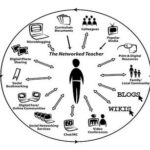Given the current findings across Canada, Indigenous education and reconciliation is an important topic to research and understand. As Brad Baker expresses, social media networks allow for the authentic voice of Indigenous leaders to be heard (7:50-7:58). Social media gives every single person a voice, allowing the opportunity for the true story to be heard (Baker, 8:07-8:12). Baker also mentions that social media allows for multiple messages to be put out rather than just one story, providing opportunity for discourse and better understanding (11:20-11:30). In educational purposes, social media allows individuals to have access to thousands of news stories that people around them feel passionate towards. Nowadays, it is much easier for people to educate themselves as all it takes is one google search, rather than having to go to a library and search through books. Social media also makes it easier to engage in meaningful discourse, as it is simple to send a message or leave a comment to have a conversation. As a teacher, it is extremely beneficial to have a strong PLN as it can provide you with lesson ideas, how to cover important topics, and support. Being active on social media creates a “networked teacher”, who has more connections and connectivity through participation on social media activities (Veletsianos, 2010). Baker expresses the benefits of having a learning community that doesn’t just support each other, but challenges each other, as it is crucial to have healthy dialogue (5:20-5:36). This allows individuals to grow and educate themselves, as well as get different perspectives, on topics they may not have fully understood previously.
Social media helps open up the conversation to many difficult topics due to the idea that one can hide behind a screen and a username. Baker expresses that for true change to happen, people have to be willing to be vulnerable, so that is what I am going to attempt to do now (13:28-13:45). I am Jewish, and given recent attention to the Israel-Palestine conflict, I have been seeing a lot of infographics and information posted by my peers on social media. It has been difficult for me to watch people who have no relation to the conflict post inaccurate information on their Instagram accounts. When sharing information on your personal accounts, it is so important you do your own research and feel comfortable talking on the topic. The spreading of miscommunication could be detrimental, as an example, the increase in anti-semetic attacks around the globe that has stemmed from this social media attention. This conflict is something I have been learning about my whole life and still do not fully understand, so I did not feel comfortable discussing it with my online community. This made me recognize how important it is to surround yourself with people you feel you can have open communication with and will listen to other perspectives rather than just being stuck in their own ways. I believe it is important to talk about uncomfortable topics, because that is the only way they will feel comfortable. However, every person needs to recognize their place within the topic and share trusted information. I believe the discussion about reconciliation, although a difficult one, is extremely important and I am glad it is being brought to light. It is important to have a diverse PLN to have perspective on difficult topics we could never understand. Kiana (https://kianasblog.opened.ca/staying-connected-aware-through-my-pln/) highlighted some excellent people on Twitter from the Indigenous community that I will be sure to check out.
Sources:
Baker, Brad. (2021). Brad Baker Edci 338. Youtube,https://www.youtube.com/watch?v=C5z8iHxW2n4.
Veletsianos, G., 2010. Emerging Technologies in Distance Education. [online] Aupress.ca. Available at: <https://www.aupress.ca/app/uploads/120177_99Z_Veletsianos_2010-Emerging_Technologies_in_Distance_Education.pdf> [Accessed 14 June 2021].


